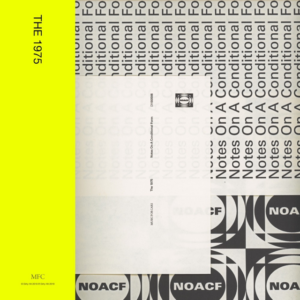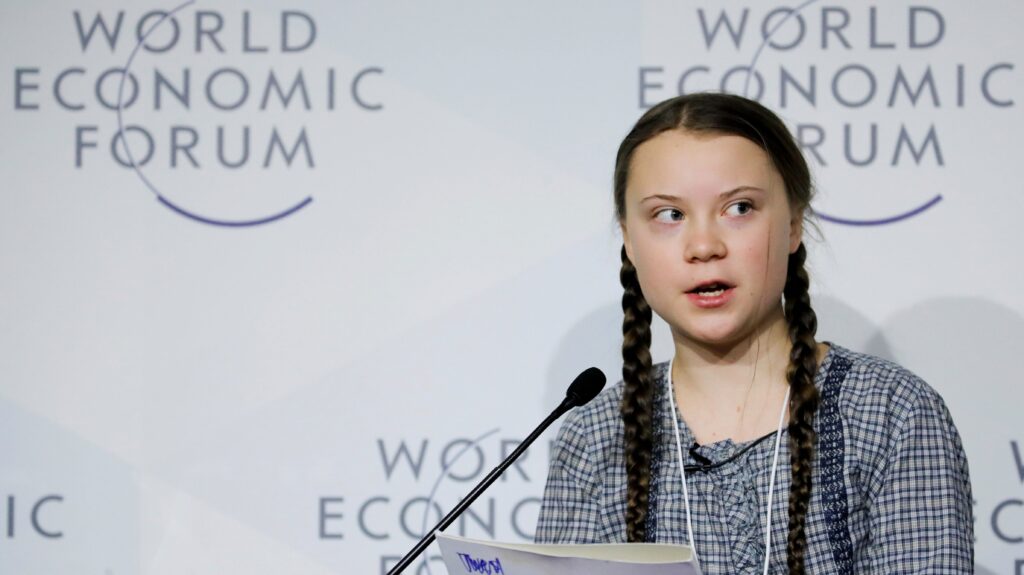
The album cover for Notes on a Conditional Form by British band The 1975, released in 2020 (from Genius, 2019).
- The self-titled song “The 1975″, released in June 2019 by British indie pop band The 1975, is the first track on their fourth full album Notes on a Conditional Form. As the opening song, “The 1975″ sets the tone and message of the rest of the album. In an effort to reflect modernity and the current state of pop culture, The 1975 decided to express feelings of gloom and ominousness in this song through the lyrics directly addressing climate change.
- This song is a spoken word piece featuring Swedish youth climate activist Greta Thunberg (image below). In 2018, Thunberg entered the spotlight after inspiring a worldwide school strike for the climate movement, attended by 2 million students across the globe. “The 1975″ is set to tranquil, yet somber, ambient instrumentals that reflect the contemplative nature of the lyrics.
- You can listen to a recording of the song here and read the lyrics here.

Greta Thunberg delivering her speech “Our House is on Fire” at the World Economic Forum in 2019 (from World Economic Forum, 2019).
How is this related to climate?
- “The 1975” highlights passages from Thunberg’s “Our House is on Fire” speech that she delivered in Davos, Switzerland in 2019 at the annual World Economic Forum (image above). This event was a gathering of world leaders discussing global economic and political issues.
- In this speech, Thunberg stresses that we as a collective are not sufficiently addressing the climate crisis, but there is still hope that we can change our ways and turn things around. She says, “We must admit that we are losing this battle. We have to acknowledge that the older generations have failed. All political movements in their present form have failed. But Homo sapiens have not yet failed. Yes, we are failing, but there is still time to turn everything around.”
- Thunberg states that the only way to mitigate the devastating impacts of climate change is by cutting carbon emissions immediately. In a simple but powerful statement, Thunberg adds, “We can create transformative action that will safeguard the living conditions for future generations, or we can continue with our business as usual and fail.”
- The message of civil disobedience in response to the politician’s ineffectiveness in addressing the climate crisis is prevalent throughout the song. Thunberg points to the importance of grassroots efforts to elicit systemic change and that we cannot solely rely on governments to address fossil fuel emissions. The last line of the song is a public call to action: “So, everyone out there, it is now time for civil disobedience. It is time to rebel.”
References and additional resources
- The 1975, “The 1975 – The 1975,” Youtube. 2019. https://www.youtube.com/watchv=xWcfzAfuFyE&list=PLx2UxP62p_2ELh5UCQtjSpRhEuwVsQKxI&index=23
- “The 1975 (NOACF).” Genius. 2019. https://genius.com/The-1975-the-1975-noacf-lyrics
- Fleming, S. “Greta: the voice of climate activism who says ‘listen to the scientists.’” World Economic Forum. 2019. https://www.weforum.org/agenda/2019/09/greta-thunberg-climate-change-strikes/
- Guy, J. “Greta Thunberg has recorded a song with the 1975 calling for a climate change rebellion.” CNN. 2019. https://www.cnn.com/2019/07/25/entertainment/greta-thunberg-1975-song-scli-intl/index.html.
- “‘Our house is on fire’: Greta Thunberg, 16, urges leaders to act on climate.” The Guardian. 2019. https://www.theguardian.com/environment/2019/jan/25/our-house-is-on-fire-greta-thunberg16-urges-leaders-to-act-on-climate.
- “The World Economic Forum’s year in pictures – key moments of 2019.” World Economic Forum. 2019. https://www.weforum.org/agenda/2019/12/world-economic-forum-2019-highlights/
